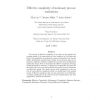Free Online Productivity Tools
i2Speak
i2Symbol
i2OCR
iTex2Img
iWeb2Print
iWeb2Shot
i2Type
iPdf2Split
iPdf2Merge
i2Bopomofo
i2Arabic
i2Style
i2Image
i2PDF
iLatex2Rtf
Sci2ools
85
Voted
CORR
2010
Springer
2010
Springer
Effective complexity of stationary process realizations
The concept of effective complexity of an object as the minimal description length of its regularities has been initiated by Gell-Mann and Lloyd. The regularities are modeled by means of ensembles, that is probability distributions on finite binary strings. In our previous paper [1] we propose a definition of effective complexity in precise terms of algorithmic information theory. Here we investigate the effective complexity of binary strings generated by stationary, in general not computable, processes. We show that under not too strong conditions long typical process realizations are effectively simple. Our results become most transparent in the context of coarse effective complexity which is a modification of the original notion of effective complexity that uses less parameters in its definition. A similar modification of the related concept of sophistication has been suggested by Antunes and Fortnow.
Related Content
| Added | 14 May 2011 |
| Updated | 14 May 2011 |
| Type | Journal |
| Year | 2010 |
| Where | CORR |
| Authors | Nihat Ay, Markus Müller, Arleta Szkola |
Comments (0)

